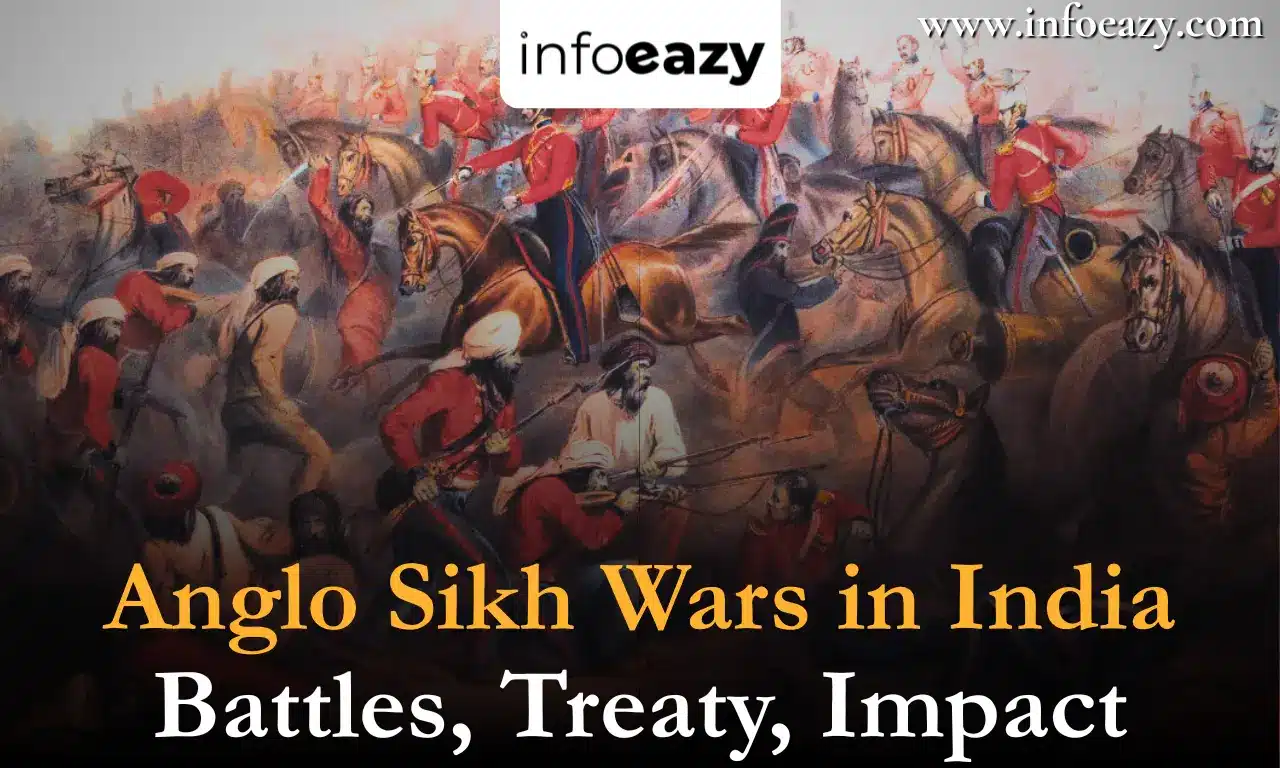The Anglo Sikh Wars were two major wars fought between the Sikh Empire and the British East India Company in the mid-19th century. These wars were mainly fought in Punjab and played a very important role in shaping the history of India. After the death of Maharaja Ranjit Singh, Punjab became politically weak. The British saw this as an opportunity to expand their rule. As a result, two wars were fought- one from 1845 to 1846 and the other from 1848 to 1849. Both wars ended in British victories, leading to the fall of the powerful Sikh Empire and the annexation of Punjab into British India.
Anglo Sikh Wars: Overview
The table below gives a quick overview of the key details of the First and Second Anglo Sikh Wars for better understanding and comparison:
| Anglo Sikh Wars: Overview | ||
| Aspect | First Anglo Sikh War (1845–1846) | Second Anglo Sikh War (1848–1849) |
| Main Reason | Political instability after Ranjit Singh’s death | Rebellion in Multan and public unrest |
| Number of Major Battles | Four | Three |
| Outcome | British victory, Treaty of Lahore | British victory, Punjab annexed |
| Key British Commander | Sir Hugh Gough | Lord Dalhousie, Sir Hugh Gough |
| Key Sikh Commander | Lal Singh, Tej Singh | Sher Singh, Dewan Mulraj |
| Important Battle | Battle of Sobraon | Battle of Gujrat |
| End Result | British control over Sikh court | Complete annexation of Punjab |
First Anglo Sikh War
The First Anglo Sikh War began in December 1845 and ended in February 1846. After Maharaja Ranjit Singh’s death in 1839, the Sikh Empire became weak. The royal court was full of power struggles, and corrupt ministers controlled the state. The Khalsa Army, which had grown very powerful, was restless. The British East India Company, always looking to expand its control, saw this as a chance to attack Punjab. As tensions grew, open war broke out between the Sikhs and the British.
Causes of the First Anglo Sikh War
- Death of Maharaja Ranjit Singh (1839)– After his death, the Sikh Empire lost a strong and wise ruler. Several kings ruled after him but none could maintain control.
- Weak Leadership and Internal Conflict– Court politics in Lahore weakened the government. Ministers like Lal Singh and Tej Singh secretly helped the British.
- British Expansion Policy– The British wanted to expand their empire in India and considered Punjab a valuable region.
- Fear of Strong Sikh Army– The Khalsa Army had grown strong and aggressive. The British felt threatened by their power.
List of Battles in First Anglo Sikh War
| List of Battles in First Anglo Sikh War | ||
| Battle | Date | Result |
| Battle of Mudki | 18 December 1845 | British victory |
| Battle of Ferozeshah | 21–22 December 1845 | British victory with losses |
| Battle of Aliwal | 28 January 1846 | British victory |
| Battle of Sobraon | 10 February 1846 | Decisive British victory |
Treaty after First Anglo Sikh War: Treaty of Lahore (March 1846)
After the war, the Treaty of Lahore was signed. According to the treaty:
- The Sikhs had to give away Jammu and Kashmir to the British.
- A British Resident was placed in Lahore.
- The Sikh army was reduced in size.
- Maharaja Duleep Singh, a minor, was made king under British control.
Impact of First Anglo Sikh War
- The British got partial control over Punjab.
- The Sikh Empire remained but under British supervision.
- The Khalsa army lost its power.
- The British posted political agents in Lahore, weakening Sikh independence.
Second Anglo Sikh War
The Second Anglo Sikh War started in April 1848 and ended in March 1849. The main reason was the rebellion in Multan under Dewan Mulraj, who refused to accept British authority. There was widespread anger among Sikh soldiers and citizens due to the increasing British control. Many Sikh leaders, including Sher Singh, joined the rebellion. The British decided to attack with full force, leading to the second war.
Causes of Second Anglo Sikh War
- Multan Rebellion– In 1848, a rebellion broke out in Multan led by Dewan Mulraj. The British failed to control it quickly.
- Sikh Resentment– Sikh soldiers and leaders were unhappy with growing British control over their empire.
- Political Interference– The British wanted to control Punjab directly, which made the Sikh leaders angry.
- Weak Royal Authority– Maharaja Duleep Singh was still a child and had no real power.
List of Battles in Second Anglo Sikh War
| List of Battles in Second Anglo Sikh War | ||
| Battle | Date | Result |
| Battle of Ramnagar | 22 November 1848 | Inconclusive |
| Battle of Chillianwala | 13 January 1849 | Heavy losses on both sides |
| Battle of Gujrat | 21 February 1849 | Decisive British victory |
Annexation of Punjab
After the Battle of Gujrat, the British took full control of Punjab. There was no official treaty this time. Instead, the British annexed Punjab in March 1849, and the Sikh Empire officially ended. Maharaja Duleep Singh was dethroned and taken to England.
Impact of Second Anglo Sikh War
- The Sikh Empire was fully dissolved.
- Punjab became a British province.
- The Khalsa army was disbanded.
- British rule extended to northwest India.
- The annexation added wealth and land to British India.
Outcome of Anglo Sikh Wars
The Anglo Sikh Wars had a major impact on Indian history. The most important outcome was the end of the Sikh Empire and the complete annexation of Punjab into British India. Other major impacts are listed below:
- Fall of Sikh Empire– One of the strongest Indian empires was destroyed by the British.
- Expansion of British Empire– The British now controlled Punjab, a rich and strategic region.
- End of Sikh Sovereignty– The Khalsa Army was disbanded, and Sikh political control ended.
- Control of the Northwest Frontier– British now had access to Afghanistan and Central Asia through Punjab.
- Rise of British Power in India– The wars made the British the most powerful force in the Indian subcontinent before the Revolt of 1857.
Also Check: Indian National Symbols
Important Personalities in Anglo Sikh Wars
Several important leaders played key roles in the Anglo Sikh Wars. On the British side, Sir Hugh Gough, Lord Hardinge, and Lord Dalhousie were the top commanders and officials. On the Sikh side, leaders like Lal Singh, Tej Singh, and Sher Singh led the armies, although some of them were accused of betrayal. Check the detailed list below:
| Important Personalities in Anglo Sikh Wars | |
| Name | Role |
| Maharaja Ranjit Singh | Founder and ruler of the Sikh Empire until 1839 |
| Maharaja Duleep Singh | Last ruler of the Sikh Empire, child king |
| Lal Singh | Sikh commander, blamed for betrayal |
| Tej Singh | Sikh commander, accused of helping British |
| Dewan Mulraj | Rebel leader in Multan during Second War |
| Lord Hardinge | Governor-General during First Anglo Sikh War |
| Sir Hugh Gough | British Commander-in-Chief in both wars |
| Lord Dalhousie | Governor-General during Second War and annexation |
Conclusion
The Anglo Sikh Wars were one of the most significant events in 19th-century Indian history. They showed how internal conflicts, weak leadership, and British ambition led to the end of a powerful Indian kingdom. The annexation of Punjab made the British Empire stronger and paved the way for further control in India. These wars are important for understanding the growth of the British in India and the fall of Indian regional powers like the Sikh Empire.
Anglo Sikh Wars in India FAQs
Q1. What were the Anglo Sikh Wars and why were they fought? +
Q2. What was the result of the First Anglo Sikh War? +
Q3. How did the Second Anglo Sikh War end? +
Q4. Who were the main leaders in the Anglo Sikh Wars? +
Q5. Why are the Anglo Sikh Wars important in Indian history? +
Tags: Anglo Sikh Wars in India Battles History Impact Notes Treaty




